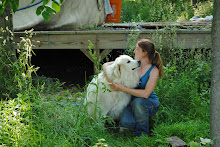Lacking Visigoths banging at the gates, we must look for subtler clues that our civilization is in decline. I found one yesterday, much to my chagrin, on the packaging of mason jar replacement lids. The title of the recipe read: Enjoy Mild Fiesta Salsa Year-Round!
Sounds good, right? A recipe for home canners? About that... The recipe calls for 5 cans of diced tomatoes, 1 package of "Mild Fiesta Salsa Mix," and canning jars. So basically you take the tomatoes out of the can, add salsa mix, and re-can them.
Let me first say that I have nothing against store bought salsa. Many a Superbowl party would not exist were it not for the good people of Tostitos and Green Mountain Gringo. They make good stuff. And I'm not even going to complain about salsa mix, even though it wouldn't be my first choice. I do have a weakness for cream cheese and onion dip mix, after all. What appalls me is the absurdity of combining canned tomatoes and premade salsa mix and canning the results! It flies in the face of the whole ethos of canning. It would be like bringing a McDonald's apple pie to a bake sale and calling it your grandmother's secret recipe. Canning is, to me, a labor of love. It is about saving energy (rather than shipping something around the globe and then preserving it not once but twice). It is a call for authenticity and traceability in food.
It is not a call for Mild Fiesta Salsa.
Sounds good, right? A recipe for home canners? About that... The recipe calls for 5 cans of diced tomatoes, 1 package of "Mild Fiesta Salsa Mix," and canning jars. So basically you take the tomatoes out of the can, add salsa mix, and re-can them.
Let me first say that I have nothing against store bought salsa. Many a Superbowl party would not exist were it not for the good people of Tostitos and Green Mountain Gringo. They make good stuff. And I'm not even going to complain about salsa mix, even though it wouldn't be my first choice. I do have a weakness for cream cheese and onion dip mix, after all. What appalls me is the absurdity of combining canned tomatoes and premade salsa mix and canning the results! It flies in the face of the whole ethos of canning. It would be like bringing a McDonald's apple pie to a bake sale and calling it your grandmother's secret recipe. Canning is, to me, a labor of love. It is about saving energy (rather than shipping something around the globe and then preserving it not once but twice). It is a call for authenticity and traceability in food.
It is not a call for Mild Fiesta Salsa.



